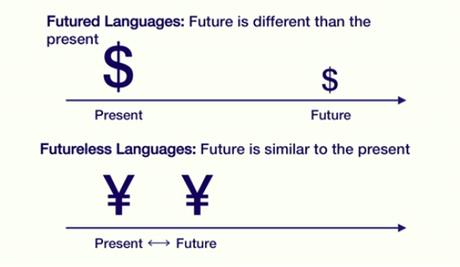
Could the way a person’s language marks the future affect their likelihood of saving for that same future? While this might sound crazy, new research shows a strong relationship between a person’s future decision-making skills and their native language.
Behavioral economist Keith Chen analyzed the savings behavior of millions of households, and found that languages that force speakers to grammatically demarcate the present and future resulted in its speakers being less likely to plan ahead. For example, Chinese and German do not linguistically divide time in the same way as English. English is a futured language that treats the two tenses fundamentally different from one another. This difference disassociates the future from the present every time we speak. Futureless languages make their speakers constantly think about the future in the present moment, which helps them have more cohesive plans down the road.
Chen goes on to postulate that futured language speakers not only save less, but also smoke more, exercise less, and have higher rates of obesity. Our propensity to save for a rainy day just got a whole lot more complicated.
(via TED Talks)
